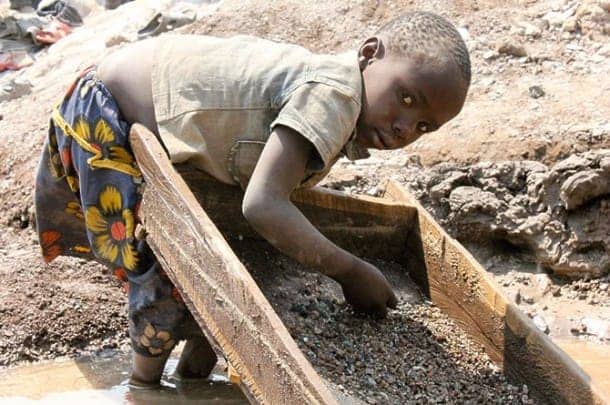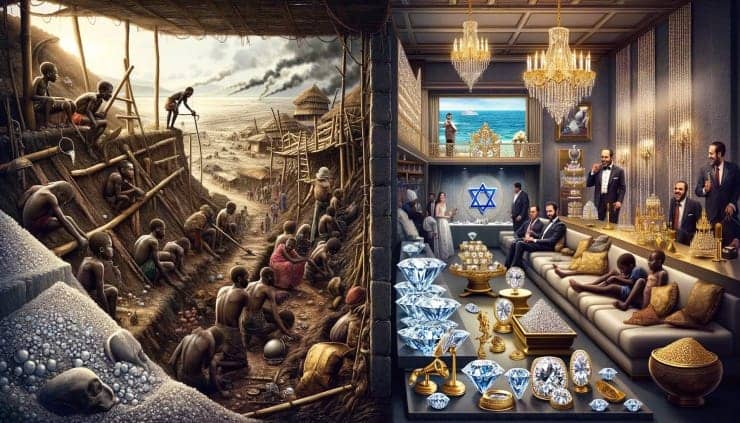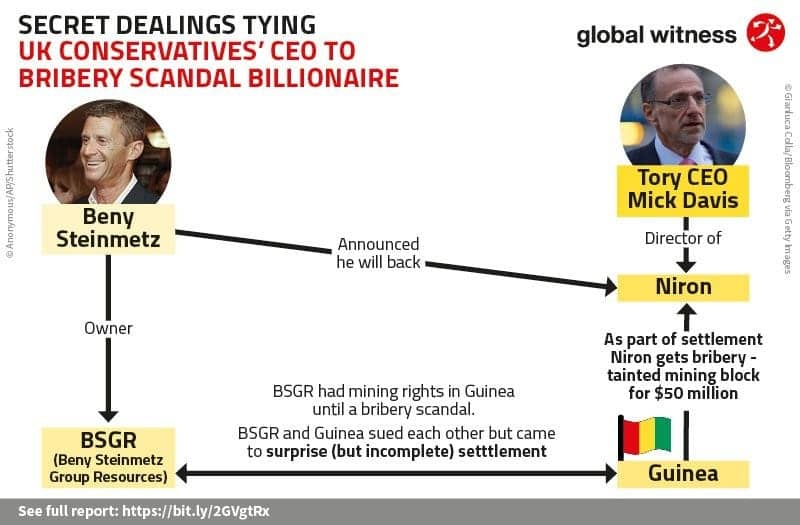
by Khafre Jay
In the heart of Africa, where the earth is rich with diamonds, lies the Democratic Republic of Congo (DRC), a land steeped in beauty and turmoil. This nation, endowed with vast natural resources, has become a tragic illustration of how global greed and geopolitical agendas can ravage a country. The DRC’s story is not just about its diamonds; it’s a saga of exploitation and lost promises. The allure of these precious stones has attracted various international players, casting long shadows over the nation’s sovereignty and the well-being of its people.
The year 1997 marked a pivotal moment in this narrative as Israeli diamond businesses began penetrating the Congolese market. This incursion coincided ominously with a rapid destabilization of the country. By 1998, the DRC was plunged into a vortex of conflict and chaos, underscoring the disastrous impact of external economic interests in politically fragile regions. This was not merely a coincidence but a stark demonstration of how pursuing natural resources can trigger and exacerbate regional instability. The echoes of this turmoil continue to resonate, revealing the deep scars left by these exploitative engagements.
The recent history of the DRC intertwines with controversial figures like Dan Gertler and Beny Steinmetz, who have become emblematic of the intricate dance between resource exploitation and international politics. Gertler’s dealings in the Congo led to U.S. sanctions that the Trump administration controversially lifted, and Steinmetz’s conviction in a mining scandal in Guinea are not isolated incidents.
Instead, they reflect a larger, more systemic pattern of Israeli involvement in African mining, particularly in the Congo – a manifestation of a global practice where resource-rich African nations are often left grappling with the consequences of corruption and exploitation.
Indeed, let’s expand the section to illustrate the intricate connection between the Israeli diamond industry’s economic significance and the alleged destabilization in Congo, highlighting the perceived hypocrisy.
The economic might and ethical paradox of Israel’s diamond industry
Israel’s foray into the Congolese diamond industry marks a significant chapter in its economic narrative. Since entering the diamond trade in Congo in 1997, Israeli companies have carved out a dominant position, contributing substantially to Israel’s economy. As of 2016, cut diamonds accounted for an astounding 23.2% of Israel’s total exports, making them the country’s most significant export product and constituting 12% of the world’s diamond production. This industry is not just a business sector; it’s a powerhouse of national economic strength, bolstering Israel’s standing on the global stage.
However, this ascent in the diamond trade coincides alarmingly with the descent of the Congo into conflict and turmoil, raising critical questions about the industry’s impact on the region’s stability.
Amidst this economic boom, the Israeli diamond industry continues to garner prestigious accolades and recognition at home, starkly contrasting with the situation in the Congo. Industry leaders like Benny Meirov of MID House of Diamonds are celebrated with high honors like the Israel Diamond Industry Dignitary Award, underscoring their esteemed status within the national economic fabric. These awards, bestowed among government officials and industry elites, symbolize the industry’s esteemed position in Israel. However, this national pride and acclaim starkly contrast with the allegations of the industry’s role in fueling conflict and destabilization in resource-rich nations like the Congo.
This dichotomy paints a picture of hypocrisy, where the industry’s prosperity and recognition within Israel are juxtaposed against the backdrop of the suffering and turmoil in regions from which these precious gems originate.
The Gertler saga
Dan Gertler’s saga in the Congo is a stark emblem of the intricate web of exploitation that plagues resource-rich African nations. Gertler, an Israeli mining magnate, found himself in the crosshairs of the U.S. government, which imposed sanctions against him in December 2017 and June 2018. These sanctions responded to his “opaque and corrupt mining deals,” facilitated by his close relationship with former Congolese President Joseph Kabila. Gertler’s dealings were not just business transactions; they were interwoven with the political fabric of the Congo, influencing decisions at the highest levels and affecting the lives of millions in the region.
The controversial pivot in this saga occurred during the final days of the Trump administration, which quietly eased these sanctions, allowing Gertler a reprieve from the stringent restrictions previously imposed. This move was not made public and surprised many, particularly given the severity of the accusations against Gertler. The easing of sanctions raised critical questions about the U.S. government’s commitment to combating corruption and promoting ethical practices in international trade.
However, this respite was short-lived. The Biden administration, responding to international outcry and the calls from Congolese and human rights groups, reversed Trump’s decision and reinstated the sanctions. This action reaffirmed the U.S. stance against corruption, particularly in the Democratic Republic of the Congo, a nation long ravaged by external interests exploiting its natural resources. The reinstatement of these sanctions by the Biden administration sent a clear message: Corruption and exploitation in international business, particularly in vulnerable nations like the Congo, would not be tolerated. This shift underscored the significant geopolitical implications and the U.S.’s role in shaping international business ethics and practices.
The Steinmetz controversy
The case of Beny Steinmetz in Guinea presents another glaring example of the intricate entanglements between African resource exploitation and international business moguls. Steinmetz, an Israeli businessman, faced legal scrutiny for his involvement in one of the mining industry’s most contentious legal disputes. He was found guilty of bribing Mamadie Toure, the wife of Guinea’s late president Lansana Conte, to secure exploration permits for iron ore beneath the Simandou mountains. The court convicted Steinmetz for orchestrating payments totaling $8.5 million between 2006 and 2012, underlining a disturbing pattern of corruption that directly impeded Guinea’s developmental prospects.
The implications of Steinmetz’s actions extend far beyond Guinea’s borders. His conviction paints a troubling picture of the role of Israeli businessmen in the global mining sector. It casts a shadow over the ethical practices of international mining deals and raises questions about the accountability and transparency of such high-stake business ventures. Steinmetz’s case is not just about individual wrongdoing; it is emblematic of a broader issue where powerful business figures exploit governance weaknesses in resource-rich nations, often leaving behind a trail of socio-economic and environmental disruption. This controversy is a stark reminder of the need for stringent international regulations and oversight to prevent the exploitation of vulnerable nations by powerful global actors.

Reckoning with neo-colonialism: a global call to action for justice in the DRC
In addressing the exploitation of the Democratic Republic of Congo (DRC), it is essential to confront the pervasive influence of neo-colonialism and the global complicity that sustains it. The voices of African activists, scholars and local communities in the DRC are not just articulating the trauma of exploitation; they are sounding an alarm for a global reckoning.
Their narratives reveal a deep-seated pattern of abuse, where the allure of natural resources, like diamonds, has consistently overshadowed the dignity and rights of the Congolese people. These voices are not merely calling for change; they demand a radical transformation in how the world engages with and values African nations and their resources.
The complexities of the DRC’s plight cannot be fully understood without acknowledging the historical and ongoing impact of colonial and neo-colonial practices. These systemic forces have shaped the country’s current governance and economic structures and limited local actors’ agency, trapping them in a cycle of survival within an oppressive framework. To truly address the exploitation in the DRC, the global community must recognize and dismantle the mechanisms of neo-colonialism. This recognition entails moving beyond passive acknowledgment to active resistance, embodying the spirit of Mario Savio’s call to action. It requires a collective commitment to make these exploitative systems so odious that they cannot continue unchallenged. The global community must not only refuse to participate in these systems but must also actively work to disrupt and dismantle them.
For the Congolese people, achieving justice and reclaiming control over their resources is inextricably linked to this global movement against neo-colonialism. The international exploitation of the DRC’s natural wealth, particularly its diamonds, must be recognized as a form of neo-colonialism and treated as such by the world community. This shift demands stringent international laws and norms that criminalize and penalize the exploitation of resource-rich nations. It requires a fundamental change in how the world values natural resources, prioritizing human dignity and community well-being over material wealth. The global community’s role is to support the DRC in its fight against exploitation and actively participate in dismantling the systems that perpetuate this exploitation.

Zionism, Israel and Africa
The activities of Israeli businessmen in Africa, particularly in cases like Gertler and Steinmetz, prompt a critical examination of the intersection between Zionism, Israeli foreign policy and African geopolitics. These instances, occurring within a broader context of resource exploitation, reflect the complex nature of Zionism as it intersects with global economic and political agendas. Israel’s foreign policy, often seen as an extension of its national ideology, raises questions about the role and influence of Zionism in shaping these international engagements.
For resource-rich but economically struggling African nations, the actions of individuals like Gertler and Steinmetz have significant implications. They exemplify a pattern where external economic interests, in this case tied to Israeli nationals, exploit vulnerabilities for profit, often at the expense of local development and governance. This dynamic challenges the conventional narrative of development and philanthropy often associated with foreign investments. The ethical responsibilities of Israeli companies and, by extension, the Israeli state, come into sharp focus.
It is imperative to assess whether these actions align with the ethical standards and values professed by Zionism and Israeli policy. This scrutiny is about compliance with legal norms and the moral and ethical implications of such engagements. The narrative of development and aid, often used to justify foreign investment in Africa, must be critically evaluated to ensure it does not mask exploitative practices. Ultimately, this discourse demands re-evaluating Israeli foreign policy and business practices in Africa, ensuring they contribute positively and equitably to the nations they engage with.
The African perspective
To truly grasp the impact of foreign exploitation of Africa’s natural resources, it is essential to turn to the voices of those directly affected – African activists, political analysts and the local population. Their insights paint a vivid picture of the ground realities and offer a crucial counter-narrative to the often dominant international perspectives.
African activists consistently highlight the disparity between the wealth generated from natural resources and the persistent poverty experienced by local communities. They argue that deals made by foreign businesses, like those of Gertler and Steinmetz, often bypass the needs and rights of the local populace, exacerbating economic and social disparities. Political analysts from the continent point to the systemic issues of governance and corruption that enable such exploitation, emphasizing the need for more vital institutions and transparency in dealings with international entities.
The local population, those who live on the lands rich in resources, offer the most poignant perspective. They speak of disrupted livelihoods, environmental degradation, and a sense of betrayal by both their governments and foreign actors. Their narratives underscore a feeling of being spectators in the plunder of their own resources, sidelined in the decisions that directly impact their lives and futures.
These diverse African voices collectively call for a rethinking of how natural resources are managed and a demand for equitable partnerships prioritizing sustainable development and respect for local communities. This perspective is crucial in reshaping the discourse around resource exploitation in Africa and in formulating policies that genuinely benefit the people of this richly endowed continent.
Conclusion
The narratives of Dan Gertler in the Congo and Beny Steinmetz in Guinea encapsulate a broader theme of exploitation and corruption in Africa’s resource-rich nations, intricately linked with Israeli business activities. The entry of Israeli diamond businesses into the DRC in 1997, closely followed by the country’s descent into turmoil by 1998, highlights a disturbing correlation between foreign economic interests and regional instability. These cases underscore the urgent need for greater transparency, accountability and ethical practices in international business, particularly in the mining sector.
As we confront these realities, it becomes imperative to champion a global paradigm shift towards justice and equity in resource management. The exploitation of African resources, often at the cost of local communities and national development, demands a collective call to action. The path forward requires a steadfast commitment to ensuring that natural wealth translates into tangible benefits for those who live on these lands and not just profits for distant stakeholders. It’s time for the global community to reevaluate and reform how we engage with the world’s resources, prioritizing fairness, responsibility and the dignity of all communities.
Khafre Jay is a hip hop organizer and business consultant, educator, keynote speaker, dope emcee and the founder of Hip Hop For The Future SPC, his latest venture, committed to weaponizing Hip Hop as a tool for social change and community upliftment. Reach him at khafre@hhhftf.org.





